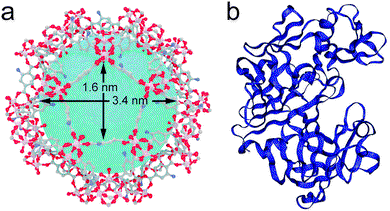Translocation of enzymes into a mesoporous MOF for enhanced catalytic activity under extreme conditions

Abstract
In this present work, we explored the potential of enzymatic catalysis for the chemical industry, addressing the limitations of enzymes in harsh environments and their low recyclability. We investigated the role of Metal - Organic Frameworks (MOFs) as active supports to overcome these challenges, primarily through enzyme immobilization and stabilization. Using mild heating and a non-polar medium during incubation, we induced the translocation of a small enzyme, protease, into the mesoporous MOF MIL-101(Al)-NH2. Our proteolytic tests demonstrated that protease@MIL-101(Al)-NH2 exhibits higher activity than the free enzyme under all tested conditions. Importantly, this biocomposite extends usability to extreme pH and high-temperature conditions. MOF immobilization also provided long-term stability, recyclability, and excellent compatibility with competing enzymes. We propose that this simple, one-step infiltration strategy could accelerate the discovery of new MOF-enzyme biocatalysts tailored for biotechnological applications.